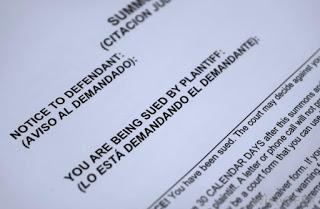 An Alabama judge granted a preliminary injunction, leading to my five-month incarceration, before a summons was issued in the case and before I was served, according to a letter from a civil-rights lawyer who reviewed the file when it was sealed.
An Alabama judge granted a preliminary injunction, leading to my five-month incarceration, before a summons was issued in the case and before I was served, according to a letter from a civil-rights lawyer who reviewed the file when it was sealed.Birmingham attorney David Gespass made the stunning revelations in a letter, dated October 31, 2013, to my wife, Carol, and me. (See letter at the end of this post.) Gespass wrote the letter between his two visits with me at the Shelby County Jail, where I had resided since my arrest on October 23 due to alleged contempt of court in a defamation lawsuit brought by Republican operative Rob Riley and lobbyist Liberty Duke.
A document that Riley and Duke filed on October 4, seeking to have Carol and me held in contempt and arrested, supports Gespass' statements.
While records show a summons was issued on October 16, according to Gespass, we never were served with it. The record also shows that we were not served during an unconstitutional traffic stop that Officer Mike DeHart conducted on September 29--and that's probably because the documents he handed us did not include a summons, meaning they were of no legal consequence. Since no other efforts (real or fake) were made to complete service, the record indicates we never were served.
What does all of this mean? It means the Riley/Duke lawsuit never existed because the defendants (Carol and me) were not summoned to court. It means Judge Claud D. Neilson had no authority to hear the case or order my arrest. It means the court had no jurisdiction over us, as we've claimed all along. It means Deputy Chris Blevins was a trespasser when, with no legal authority, he entered our garage, beat me up, and doused me with pepper spray. It means that all of the deputies who repeatedly traipsed over our property to supposedly serve us with court papers, which did not include a summons, had no authority to be there and also were trespassers.
In short, it means the whole process was more blindingly corrupt than even Carol and I could have imagined. Here is the scariest part of all: This was an "extra judicial process"--orchestrated by Rob Riley and Liberty Duke, the Shelby County Sheriff's Department, and whoever was pulling their strings--with no lawful authority from any court.
I have reported several times that my arrest, in essence, was a kidnapping because DeHart served us via a traffic stop that violated the Fourth Amendment right to be from unreasonable searches and seizures. Thanks to the information in Gespass' letter, we now can remove the words "in essence" from that sentence.
I was kidnapped, pure and simple, by individuals who clearly knew they were acting outside court boundaries.
Whenever anyone is served with a lawsuit, the first document they likely see is the summons--it always should be right on top. The summons, signed by the court clerk, should identify the parties and the case number and instruct defendants that they have a certain period of time (usually 30 days) to respond. Many summonses include language like "This document is important; do not ignore it" in bold letters.
The deputies who gave the appearance of trying to "perfect" service had every reason to know there was no summons--and that means there was nothing from any court to authorize their actions. That reduces Blevins' actions in our garage to an assault and battery.
What is a summons and why is it important? A definition can be found here, at legal-dictionary.com. Here is the key information:
The summons is the document that officially starts a lawsuit. It must be in a form prescribed by the law governing procedure in the court involved, and it must be properly served on, or delivered to, the defendant. If the prescribed formalities are not observed, the court lacks authority to hear the dispute.
Were the prescribed formalities followed? Not according to Gespass. Here is the third paragraph from his letter:
First of all, both the temporary restraining order [TRO] and preliminary injunction (the latter is now in effect, but both say the same things) appear to have been issued before service was effected. The hearing on the preliminary injunction was on September 30, it [the injunction] was issued on October 4, and the summons was not issued until October 16. However, I would assume the preliminary injunction order was included in the service materials you threw away. One could argue that you are entitled to a new hearing, since you were not able to defend at the first one, but that still does not excuse failure to comply with a court order or seek reconsideration. Incidentally, the motion to quash was also denied, and, I believe, correctly so.
As we explained in a post yesterday, the last three sentences of that paragraph are utter bunk--because Gespass shows in the first two sentences that the court had no authority to hear the case.

David Gespass
Speaking of our Motion to Quash, we filed it on October 16, the same day the court finally issued a summons. It appears someone in the clerk's office saw our notice, was about to enter it into the file, and said, "Holy crap, there's no summons in this case! I guess I had better create one out of thin air, stat!" It's also possible the clerk discovered there was no file at all and decided to create a summons to give the illusion of some court involvement in the matter.Do we have only Gespass' words to show there was no summons? Nope. One of Riley's own documents--Petition to Hold Respondents in Contempt, dated October 4, 2013--indicates the same thing. Item No. 4 in the petition, which begins at the bottom of the second page, states:
On September 30, 2013, the court held a hearing on the Petitions for Preliminary Injunction. Respondents did not attend the hearing even though they were provided notice of said hearing. That notice, contained in the TRO, was flagged when Respondents were served with it, which should have drawn Respondents' attention to the TRO and the date of the hearing on the Petitions for Preliminary Injunction.
First, the court record shows we were not served with the TRO. Second, a defendant is not called to court because a document is "flagged" with "the date of the hearing" (whatever that means). A defendant is called to court when he receives a summons--and the record shows a summons was not issued until October 16, and we never were served with one.
Countless news accounts of my incarceration--even some that were well reported and generally accurate--claimed I "ignored a court order" and hinted that my arrest was somehow justified (at least a little) because we did not appear in court. Now we know that Carol and I never were summoned to court, that we had no lawful reason to be there.
Many questions remain about the flagrant corruption surrounding the Riley case, and here is one of the biggest: If the court did not issue a copy of a summons and the complaint for deputies to serve, who did give it to them? The evidence suggests that someone connected to Riley and Duke gave copies of the complaint directly to the sheriff's office--and deputies went through the charade of "serving" them, knowing there was no summons and no authorization from the court. In other words, the plaintiffs and law enforcement conducted a nifty end run around the judicial process.
What can we take from all of this? Well, the latest information removes all pretense of lawfulness surrounding my arrest and incarceration. When the court appeared to have some authority over the matter, that gave at least a hint of legitimacy to the deputies' actions. Without court authority, however, cops become common thugs--especially in a civil matter, such as this.
That means I was the victim of a felony assault, trespassing, kidnapping, obstruction of justice, deprivation of constitutional rights, conspiracy . . . there is no telling how long the list might get. And these are criminal matters.
It's long been clear that Carol and I have strong civil claims connected to all of this. But now, it appears to have jumped into heavy-duty criminal territory--with Rob Riley and Liberty Duke at the center of it.
David Gespass Letter by Roger Shuler
